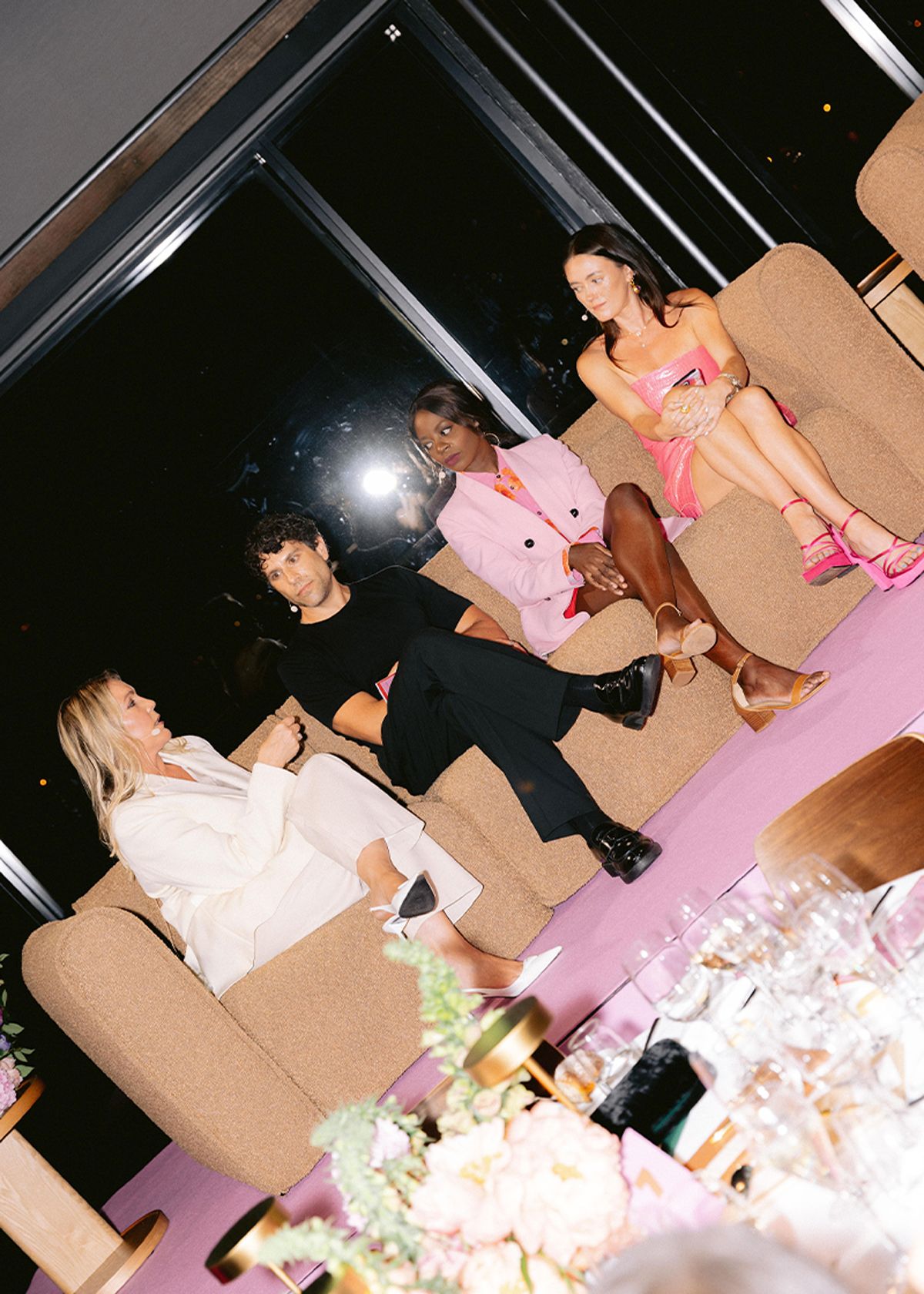
Inside the minds powering the beauty industry
In their panel discussion at the InStyle Beauty Summit, four of the leading minds shaping beauty today discuss the future.
PHOTOGRAPHY by CLAUDIA LOWE
INTERVIEW by LAURA AGNEW
Beauty is big business. According to Statista, in Australia alone the revenue generated in the beauty & personal care market is expected to reach $12.3 billion by the end of 2025. The industry is changing at a rapid pace, so we brought together four people at the coalface of that transformation for the InStyle Beauty Summit. These people are experts in their respective fields, helping to shape the beauty industry from behind the scenes: Kate Blythe is the chief marketing officer of MECCA, tasked with elevating brand identity and cultivating meaningful customer connections across platforms. Paul Balbo is the commercial lead for Meta ANZ, working with new brands of all sizes to shape their global strategy and innovate with tech. Doone Roisin is the founder of Female Startup Club, a next gen media company and prolific podcast with a mission to accelerate women's economic opportunity and power. Effie Asafu-Adjaye is a marketing consultant and founder of Beautiful Sparks, an agency which specialises in helping new brands to define and develop their identity in market.
Here, their InStyle Beauty Summit panel discussion with InStyle Executive Editor, Laura Agnew, about the future of beauty.
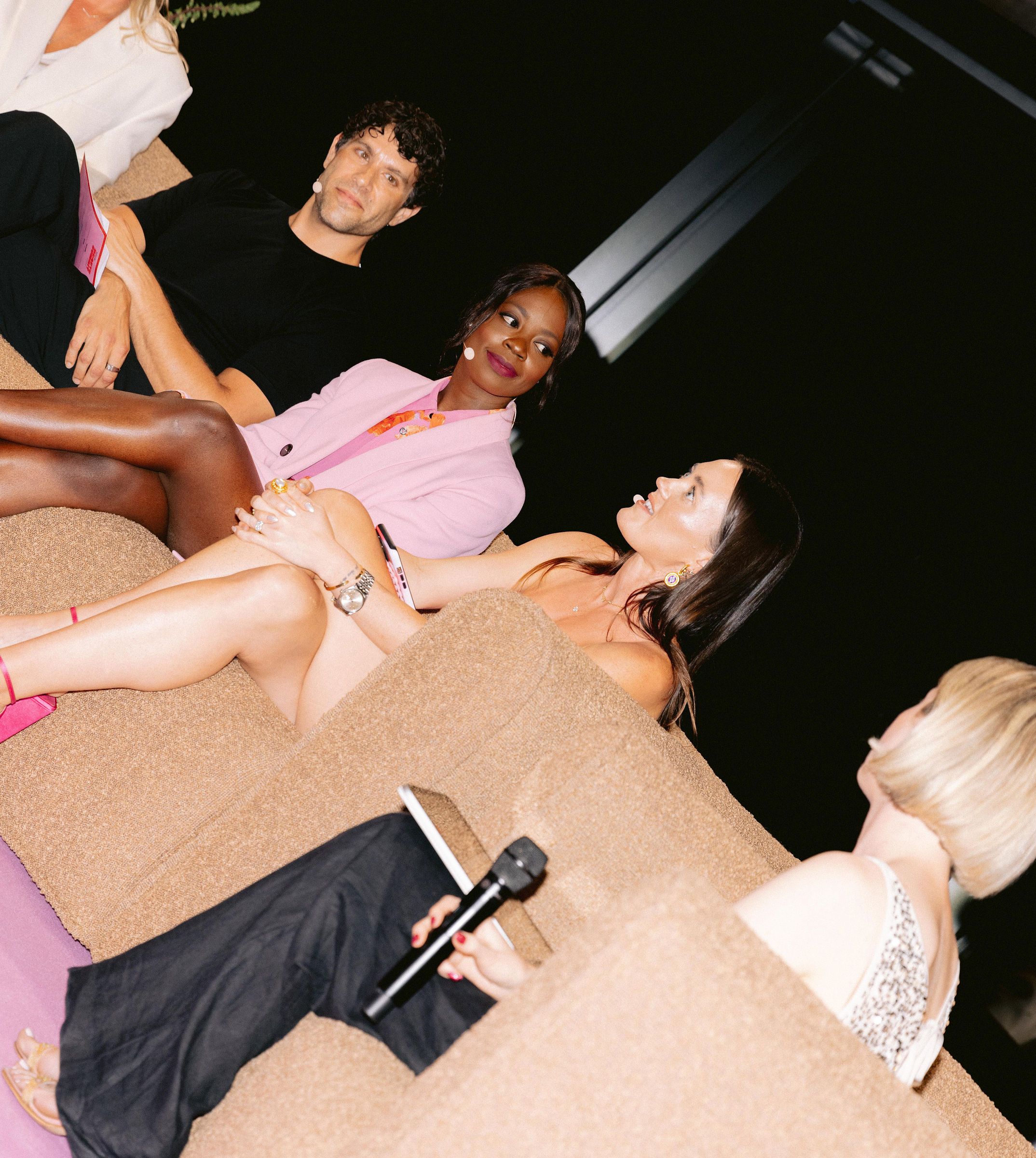
LAURA AGNEW: I want to start with a question for all of you. The beauty industry has had to change so dramatically, whether its beauty standards and the need for representation, the intense level of knowledge that consumers are bringing to brands — bringing to every touch point and engagement — and also people are buying beauty a lot later in life and, obviously, as we know, a lot earlier too. With all of that change, what do you see as the biggest risk and also the biggest opportunity for brands who are trying to connect meaningfully with consumers?
KATE BLYTHE: It's a great question. I think things have changed a lot over the years, and it's changing at a fast pace, so this is not something that's slowing down anytime soon. The customer has changed, we've got much younger consumers now for beauty, but also to your point, these customers who are trying different products much later on in life as well, which is amazing. I think for brands, it is an evolving ecosystem, so actually how you show up on platforms is incredibly important. But the biggest thing I'm thinking, you definitely see with Richard Christiansen and Flamingo Estate, is the importance of having a really unique point of view. I think brands have to have that cut through. You've gotta have meaning, you've gotta tell the brand story. Richard and I were just talking about it actually, about the ‘story behind the brand’ thing being so incredibly important to consumers now. It's not just about products on a shelf. So that is ultimately the biggest challenge.
But I think at the same time, a big risk at the moment for brands is imitations. So if you've got a really incredible brand and product that's out there, then you can get an imitation product that you’ll see on TikTok, or you see on Meta channels very quickly, that actually isn't a real, true, authentic representation of that product. And I think that in itself is pretty unique and it's definitely a changing trend. I think for consumers and how people actually consume content — and you will all know this across all the digital channels as well — where people go for their source of inspiration these days is not back in the old world of going and being educated in the same way. They're actually getting it from peer-to-peer views. They're looking at people, they're going to look at influencers they follow. And really, the trust level that you have to have as a beauty consumer these days, I think is a real opportunity and a real challenge. And I think brands have to understand how to play in those multiple spaces and actually be modern enough to respond to that or be so purist in their thinking, like Flamingo Estate, where you do it your way and you stick to the brand values that you have and don't try and compete in these different channels. I think it is a fast moving space. There's a lot of conversations to be had, you've gotta stick true to your brand, but also make sure your brand codes are really truly authentic as well.
LAURA: Paul, would you agree?
PAUL BALBO: I would agree. I agree authenticity is so important in today's landscape. We see it so much across Meta platforms and I think the biggest risk is not meeting consumers where they are. Beauty has really shifted. To your point, it's a connected experience and I think a lot of big brands can miss that; the real opportunity is working out how you can stay authentic. It's quite easy to try and be everything to everyone and that dilutes who you are, it dilutes your voice. So I think you have to stay authentic and really capitalise on that connected experience.
KATE: Yeah.
PAUL: And don't lose who you are, don't lose your voice. So think and really capitalise on a connected experience.
KATE: And just jumping in on that, consumers are really savvy, right? So the beauty customer these days, if you've got a product that's no good, they will talk about it and tell that story. You have to have a brand that's authentic, but also, you have to have products that work and they work specifically for you as well.
EFFIE ASAFU-ADJAYE: I think from my perspective, one of the biggest risks is how, when brands misstep they go viral, and how damaging that can be. These last few months, we've seen brands kind of thrown under the bus around diversity: pigmentation not being wide enough, but presenting it to the consumer as if it is diverse. And I think the conversation right now that's being had is, when you think about inclusivity, it's not just who's in the marketing campaign. The conversation now is, who's working at the lab? Who's swatching products on their wrist in the office? Who's making decisions around content? I think the conversation around accessibility and diversity is really interesting. We're now seeing brands broadening that and now we're seeing physical disabilities considered. So I don't know if many people know, but Rare Beauty's packaging is actually designed so people with dexterity challenges can easily open it. That's kind of the next conversation where we also have brands like Milou, like sisterwould, that have braille on their packaging. So I think it's really interesting to see where that conversation is going.
DOONE ROISIN: To echo what Kate and Paul were saying, I think authenticity is such an opportunity, especially when we think about how you can win with your weirdness and do things that are really unique to you and really lean into that kind of side of the brand, know who you are and that magic. But on the practical level, I think is — sorry Paul — I think the opportunity and the risk is the TikTok shop. And I mean that in the sense that if we see what's happening with live selling and live streaming and watching how brands are absolutely creating these deep experiences through their hosts and their studios that are 24/7, really experiential, really fun and really vibrant, I think that's really a big opportunity. And then I think the risk is exactly what we're seeing play out in real time where, who knows what happens with these platforms, who knows what's gonna happen in the US with TikTok and whether it comes to Australia? I think that's a bit of a risk, putting a lot of eggs in one basket and not owning that relationship with your customer.
"The conversation right now that's being had in beauty is, when you think about INCLUSIVITY, it's not just who's in the marketing campaign. The conversation now is, who's working at the lab? Who's swatching products on their wrist in the office? Who's MAKING DECISIONS around content?"
LAURA: Off the back of that, I want to ask a question specifically about social. We’ll start with you Paul, but I'm sure everyone will have an opinion on this one. The sentiment has ebbed and flowed around influencers. Brands want them, they need them, they don't want to need them. The conversation around macro and micro is fast-evolving. What is the future of this space?
PAUL: Yeah, creators are a rapidly dynamic space. I think they’ve definitely established themselves with a voice of credibility and I think that they are catalysts of growth. I think brands know it and it allows the brands to learn to play with influencers because they can see they're not going anywhere anytime soon. For us, I think there are three main areas that we see growth in this space. The first is around niche voices. So if you think about social to date, and the creator landscape, particularly our platform has been very much on a social path. So I follow you, I follow your brand and seek content from creators that resonate. So that is a huge opportunity for brands because it means that people who put content out are more likely to find new audiences, so I think we're going to see more leverage of those niche communities than we've seen and I think that'll grow overtime; tools will help solidify that. The second for me is the growth of hybrid. So we've been in a situation where we've had craft creators, so helping with editing, producing and creating sort of ‘brand assets’, and we've had personalities that are almost an editorial voice. We're gonna see the combination of those coming together with hybrid, so, personality-led creators that actually have AI and tools to be able to produce different types of video content for brands at scale. And the third is, we're starting to see brands create voices more digitally and I think we're going to see a pivot to community management. So how do you take on a voice into your brand for the long term and how do they actually become part of that community experience with your customer?
LAURA: Kate off the back of that; a brand speaks to one person, but at MECCA you're talking to everyone. Are there learnings from how MECCA communicates that brands could take on in respect to reaching new audiences?
KATE: Yeah, we really care about everybody feeling welcome into MECCA; I think it's one of the things that we really put at the heart of it. So actually where we’ve seen this huge influx of younger customers coming through in the last four to five years – which has been a real phenomenal shift – we have really embraced that. We know that they're the future demographic as well. We want them to feel comfortable asking us about skincare; we don't want them to come in and only talk to their friends. So we've actually had to put a lot of money and time and resources into educating our teams as well on how to actually embrace all ages of customers in a store environment.
But also, we've really thought about how to have that brand experience work for them, for everybody, in different channels and on different platforms. So we have been consistently playing this kind of multi-channel game where we are really thinking about every bit, every customer cohort, how they're interacting, where they're gonna find us, what they want from us in those moments? And it's fascinating with our Beauty Loop program — which is our loyalty program, which I'm sure some of you may be on — we have unbelievably passionate people across that whole platform and we listen to them. So we ask them to come in, we do focus groups with them on a monthly basis and we ask them to tell us what they need, what they feel they're not getting. We really have this kind of full playback of customer engagement as well. So hopefully if you want to go to a Double Bay store and have a really personal experience, you can do that. You can go to MECCA George Street, which is like a beauty playground and, there's a different kind of rhythm as well, for our customers. We're always thinking about how to evolve that store footprint as well and, and have these different moments of excitement as well.
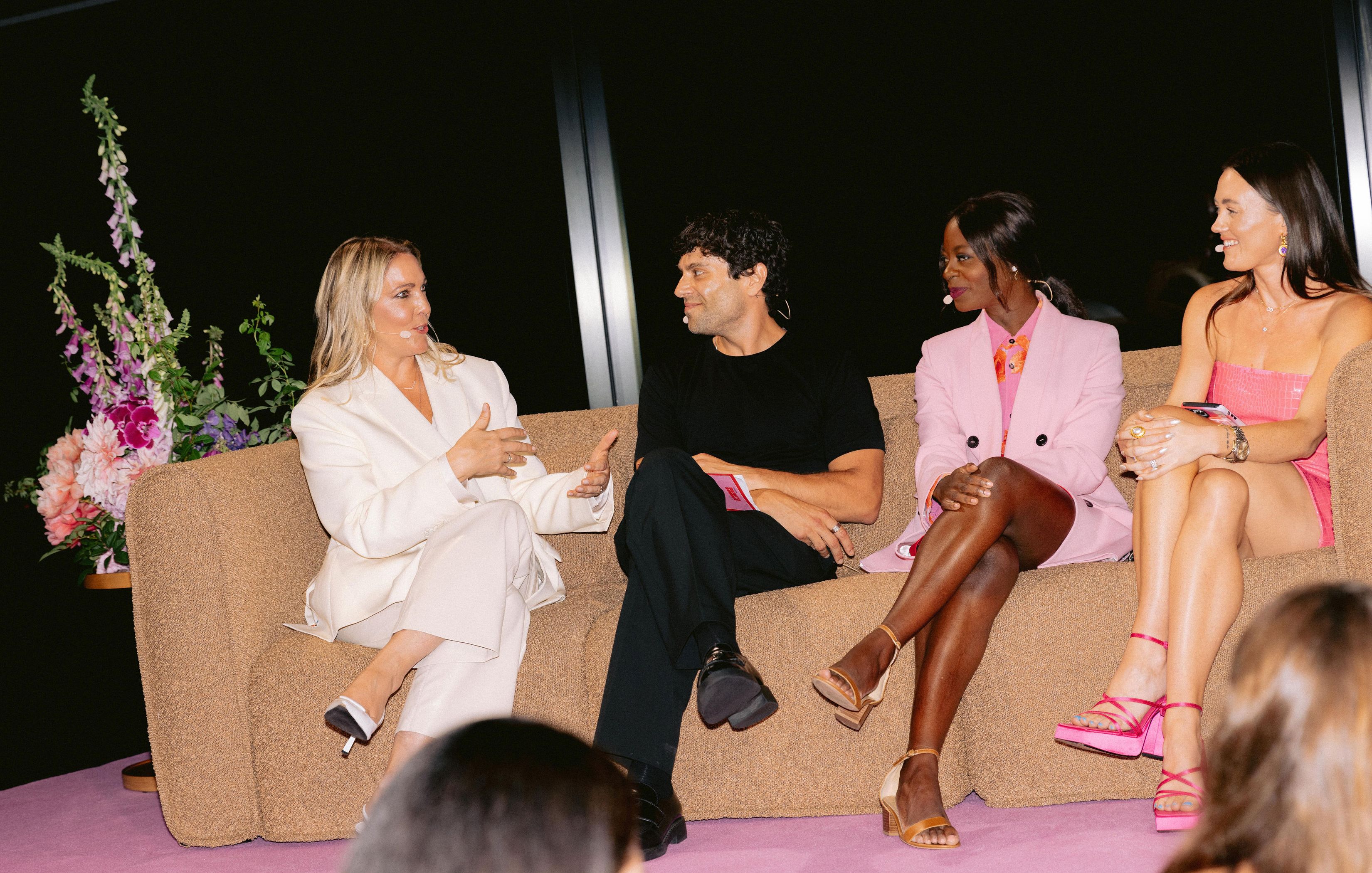
LAURA: It's a big world you’re building. Effie, you’re situated at that point in the founder's journey where they're only just beginning to world-build and turn their vision into reality. Obviously you have a lot of experience and you sort of are really across what's going on in the entire landscape. Locally and internationally, who do you think is doing it well? Who should people be looking to?
EFFIE: So the two examples that come to mind. The first has been around for about a year and I think they have the best in class example of customer intimacy. They're based out of London, they're called Calling Beauty. Their value proposition is about putting our customers on loudspeaker, beauty that listens and the way they deliver that is so powerful. So they have a WhatsApp chat where the community literally talks about beauty, life, they review samples, they meet for coffee. And it's just a consistency. So that's ultimately their true north, but they deliver every touch, to the point where some of their lip glosses are named after their super fans, which is just so powerful. And I think particularly with smaller brands, community and connection is your superpower. It's so efficient. In terms of loyalty and all the things that brands want, I think they're a really good example. Locally, I'd say they've been around for a while, but, Fluff. They're a cosmetics brand out of Melbourne, I think from day one they kicked it out of the ballpark, but they had that perfect balance through the customer journey of talking about products, keeping with culture, but still telling stories. And I think it's so powerful that brands don't get lost on just pushing products because ultimately stories are what connect us, it's how we fall in love with brands, how we build relationships. So I think brands that weave that into everything that they do, it just gives them so much differentiation and power in such a crowded landscape.
LAURA: It is a very saturated market. Doone, a question for you, investment is an even greater golden egg opportunity in such a saturated market. What do investors look for when evaluating beauty brands or startups?
DOONE: Again, going back to authenticity and being able to really lean into the magic that you have, and the superpower that you have as a founder and as a person and how that's woven into every corner of what you do is just so critical. When dupe culture is happening and brands are copying left, right and centre, no one can ever copy that magic. So an investor is looking for that in a founder. But the practical answer, I would say that if you're looking at a traditional business model where it might be a first time purchase and you don't have that kind of repeatable mechanism built into your business model, that isn't as sexy as a subscription-based model that has that recurring revenue predictability. You're able to acquire a customer at a higher cost because you know that further down that lifetime value and that kind of repeatable revenue that you're driving, you're gonna be able to make that back. And I think that's something that investors are looking at: what's that predictability? What's that repeat revenue? And then looking at things like churn and retention.
LAURA: Obviously there's been a lot of talk about how Gen Z works differently, their different values and expectations. You work with a lot of young business owners and I think you do an amazing job of having a Gen Z mentality and presenting your brand in that way. How do the qualities of Gen Z act as a benefit for a hindrance in business? What advice do you give to young brand founders who are coming into a space where they're having to deal with older generations who do things differently or have different expectations?
DOONE: Yeah, I do work with a lot of people who are in that new generation and a lot of founders who are coming into starting a brand or going into the workplace as a younger gen. The first is there's such an opportunity with the new generation to partner with maybe an older generation business owner in the sense that these are our future change-makers. This generation has grown up with the internet, they're AI natives, they're going to be able to use these tools in incredible ways that we can't even fully wrap our heads around yet. And so I think that when you can blend that magic between someone who has that insight — it's just inherently built into what they're doing and oozes from every corner of their internet capability — with the older generation, you can really rethink business operations, backend logistics, marketing, everything that you do. You can really kind of lean on that together.
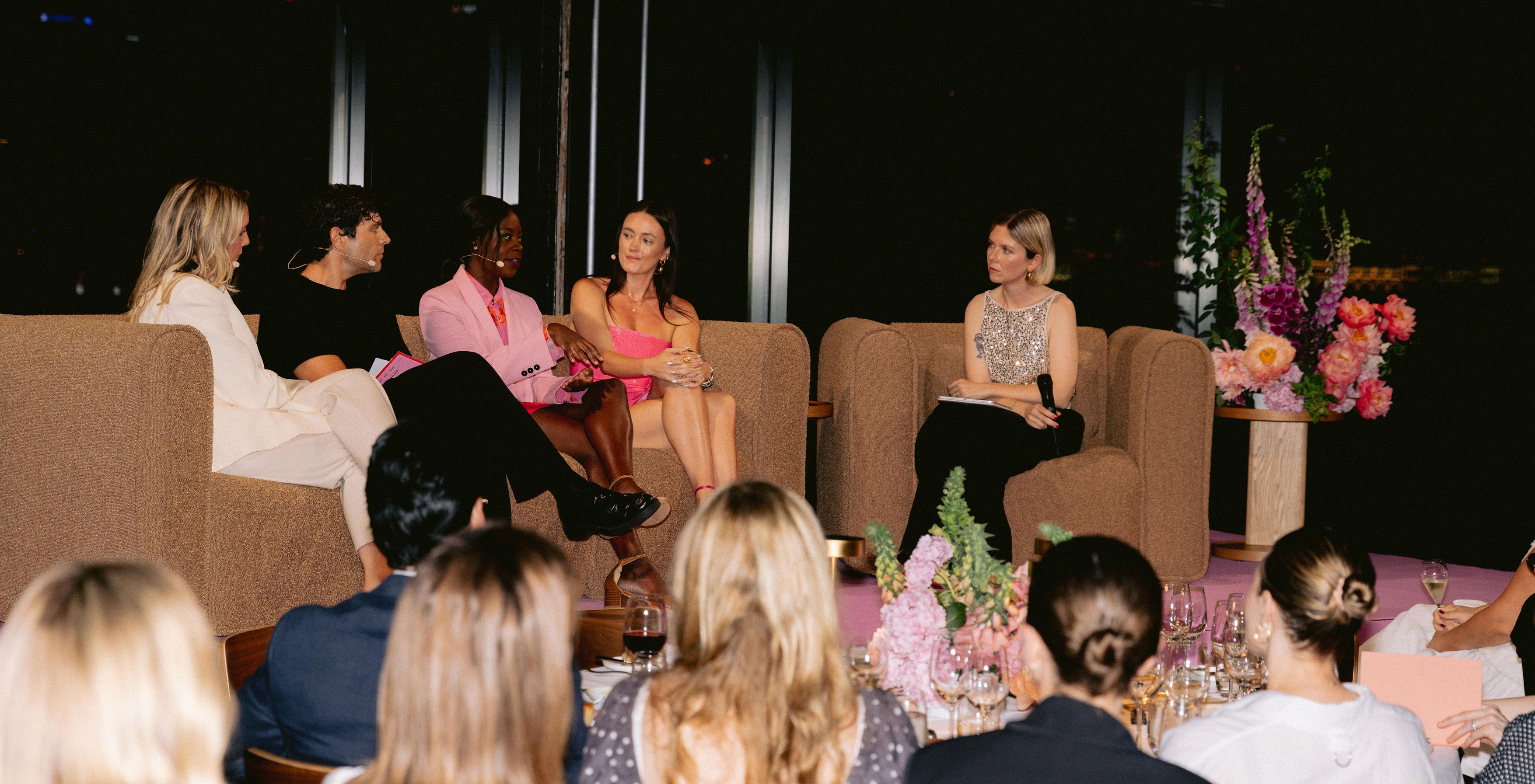
LAURA: What do you see as being an untapped space in beauty? Paul, when we spoke on the phone, you mentioned menopause was sort of the next great frontier.
PAUL: Yeah, menopause is something that’s being spoken about on the platform and I think that's mainly because we've got millennial women who grew up with social media now being there and having that conversation. That's a really huge area, so we're seeing growth in wellness products as a result — brands talking about the types of products that may affect hormones and those sorts of things.
The other one is this association is how beauty standards have changed and what that's done for consumer psychology. So if you have a look at the wider beauty conversation, it’s being driven by self love and self care. And when you break that down, we've seen a real shift in what that means to consumers. So what used to be a bubble bath, face masks and champagne is now bed, boundaries and mindfulness. That idea of self love and self care is different. It's about being beautiful inside as much as outside. Seeing that real shift, that's a huge opportunity for segments of untapped shoppers. So what are future drivers of this? Men's is a huge one because they've kind of gone from grooming to styling to beauty, but with women, the spectrum is so broad. I think brands get lost trying to just communicate in a clear fashion. You look at, you know, demographics and for example, with men's brands, you might take King Charles and Ozzy Osborne, demographically, they're the same, but you're probably not gonna talk to them in the same way. And I think that gets lost a bit. You need to target your audience; who are they, what do they care about?
LAURA: Kate, do you see that as well?
KATE: I love what you just said about menopause. I think that's a huge piece. Also wellness. So we're opening the, I think the world's biggest beauty store next year. It's in Melbourne and it's pretty huge — 4,000 square metres. And so we are completely rethinking the whole beauty destination and within that, there’s an entire wellness destination and apothecary. Actually Flamingo Estate will have a big, big part of that space. We’re really thinking about wellness very differently because actually, if you think of beauty as we used to, which is like you buy a cosmetic or a product and that's it, you’re kind of good, now it's that full end-to-end experience.
So from the moment you wake up to the moment you go to sleep, we’re actually helping with sleep, helping with stress, happening with all life stages as well, helping you get ready for those big moments in your life. But going in with, you know, a son, a daughter, a mother, a grandmother, a father, and everybody having this experience together. So really creating a world where you are gonna feel amazing, you're gonna look, feel, and be your best and be able to do what you want to do to go out in the world and achieve what you want to achieve. I think that is how beauty is so far removed from what it once was, which was just a sort of a viewpoint that was put upon everybody in terms of, you need to try and achieve this look as a woman, “age is bad” and all these things. So I think these conversations are amazing and I think it's so phenomenal to think that you can do things to slow down the aging process, but you can look after yourself well, you can actually deal with stress differently and you can help yourself sleep in wellness ways. And that in itself is a super exciting conversation changer.
LAURA: The storytelling potential around all of that is so much richer than we had in the beauty space, you know, in the past 20 years or so.
KATE: And I think the key with that is you need experts, you people who know their stuff. It cannot just be somebody saying you need to buy these ear seeds because we're telling you to, it's somebody who actually understands it. So really getting experts into the space to talk about the why and having doctors and thinking quite differently about how we talk about beauty… It’s about having this evolving conversation that people can trust.
LAURA: I'd love to hear from each of you one piece of actionable advice that you think could take a brand to the next level.
DOONE: I think that this kind of ties into the change that we're seeing. You know, we used to be sold this message of perfection and needing to live up to these certain beauty standards and that's really shifted. We're really able to see beauty for the real women that we are and the real men that we are. When this applies to people who are starting businesses and growing businesses, it's not about perfection. It's about getting out there, getting started and just giving it a go and not worrying about being perfect. I think those two things work really well together.
EFFIE: From my perspective, I think as people, we want to feel part of something. So I think when it comes to building your brand and building a world, it's about thinking of it like you’re creating a cult where it's about having some sort of brand philosophy that people can get excited about or feel something. And I think it's about showing your values and what you stand for and finding that right balance between brand, product and culture. And just giving people something to fall in love with.
PAUL: Working in tech, it's very much about test and learn, but I think that can really sort of inhibit what you can do. Sometimes you have to take experimental swings and, in order to move forward, you need to throw the testimonial book out and just take some swings because test and learn only allows you to do 10% here or there. And I think we're ripe for something different.
KATE: I love that point about feeling and I think actually, in this day and age where there's so much bad stuff going on, what really we all want is something that you can feel emotional about, that you can have something that you share with your friends, that you can believe in a brand that actually does more for you than you actually needed it to. And it talks to you in a way which makes sense. Whether that's the values, whether that's how the brand has been put together, the people behind the brand, the stories they're telling. And actually, if you could go in and have a sort of transformation, if you've got bad skin or you've got rosacea, and somebody can help you with that, it could change your life in many ways and give you confidence. I really believe that brands that have something deeper than just the product on the shelf are the ones that are gonna have longevity and have cut through. So emotion, heart share. And then on the entire flip side, I think be innovative, be brave, be curious and don't sit still and wait for things to happen to your brand. Keep moving it forward.
LAURA: I think that’s a perfect note to end on. Thank you all for your time and wisdom on the couch.
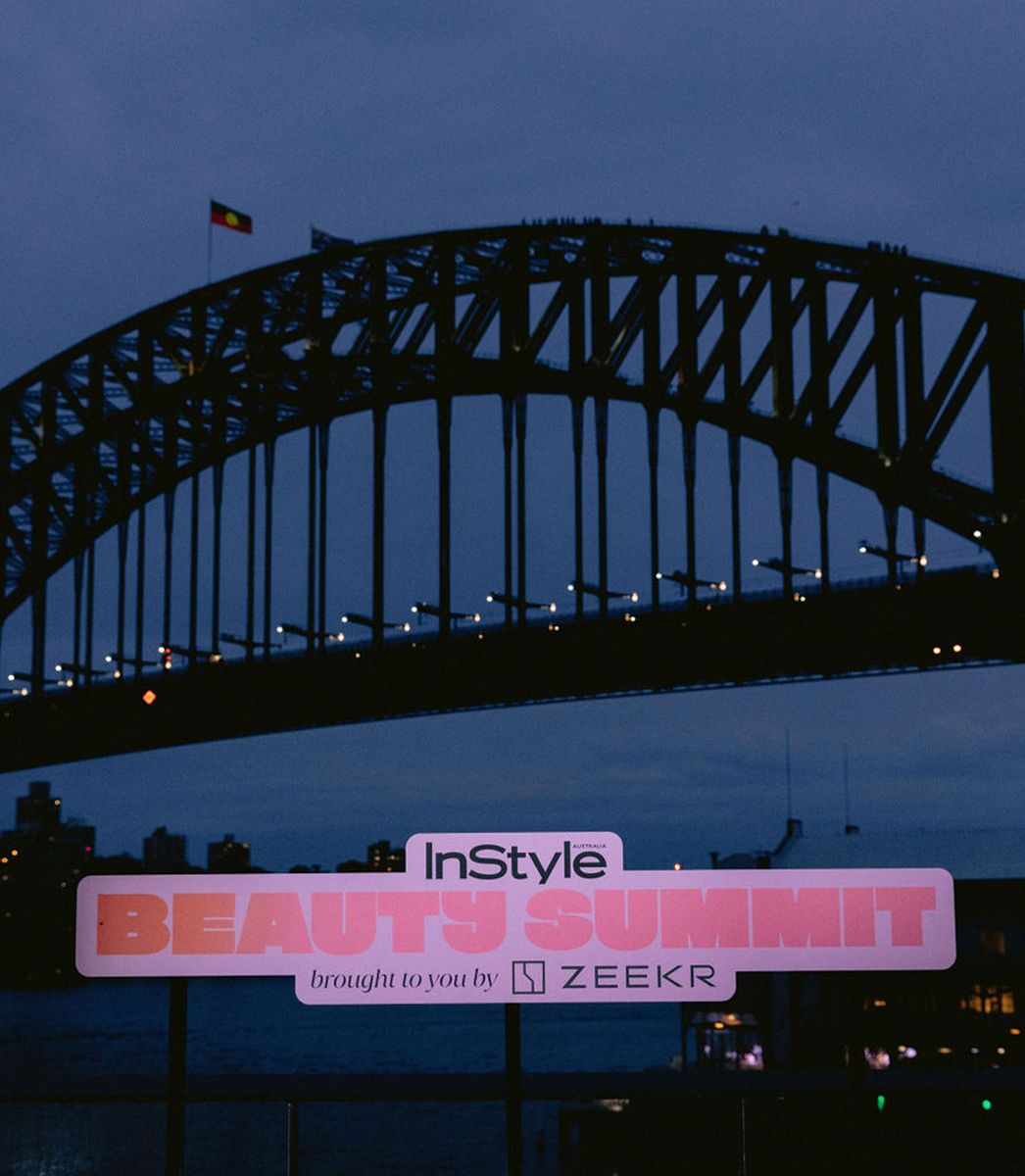
Inside the inaugural InStyle Beauty Summit
Presented by Zeekr.
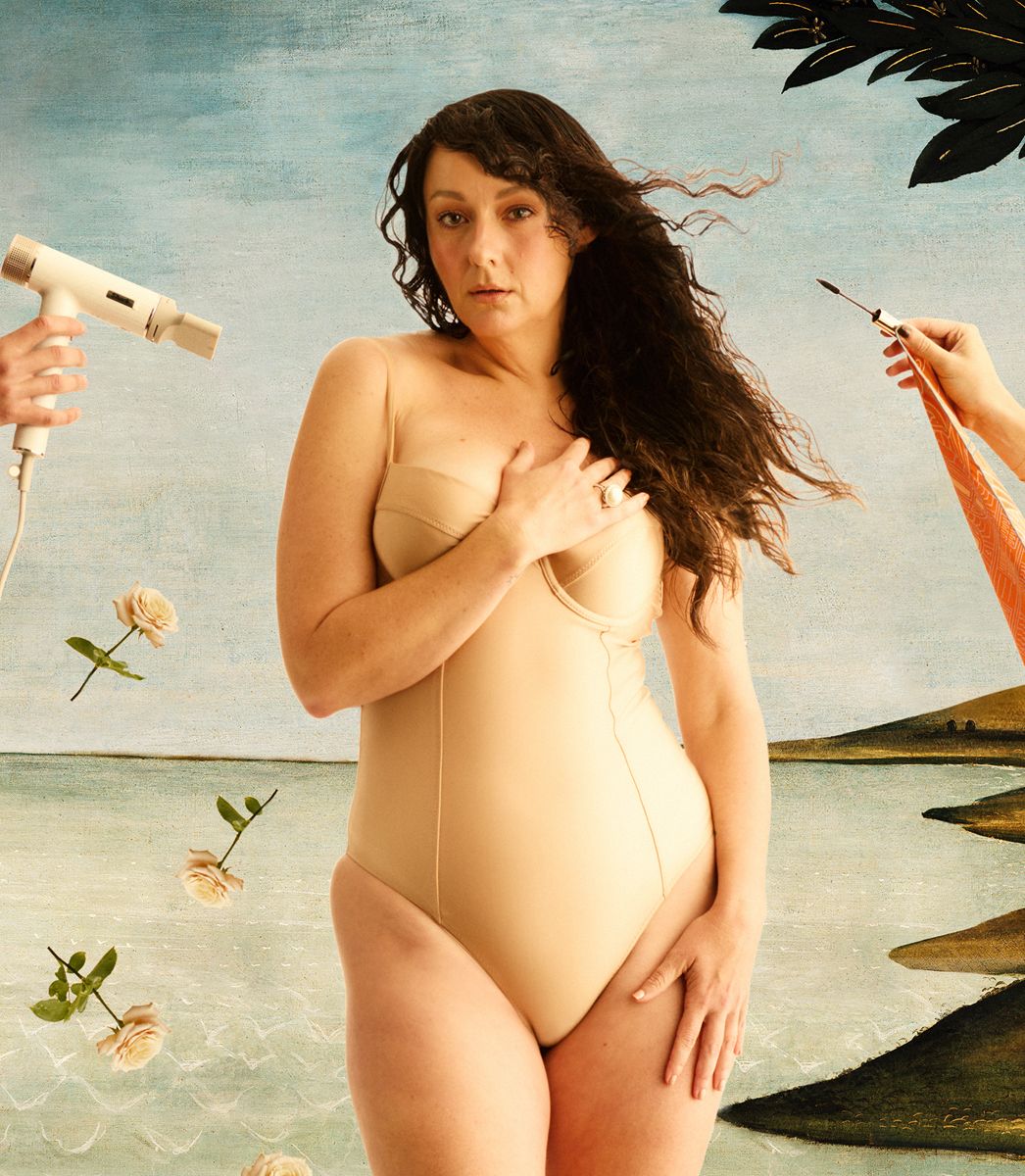
Celeste Barber wants you to feel seen and heard
An Instagram sensation, actor, stand-up star, national treasure — and, now, beauty founder with her makeup brand, Booie. In her conversation at the InStyle Beauty Summit, she discusses creating something for the people who were left behind.
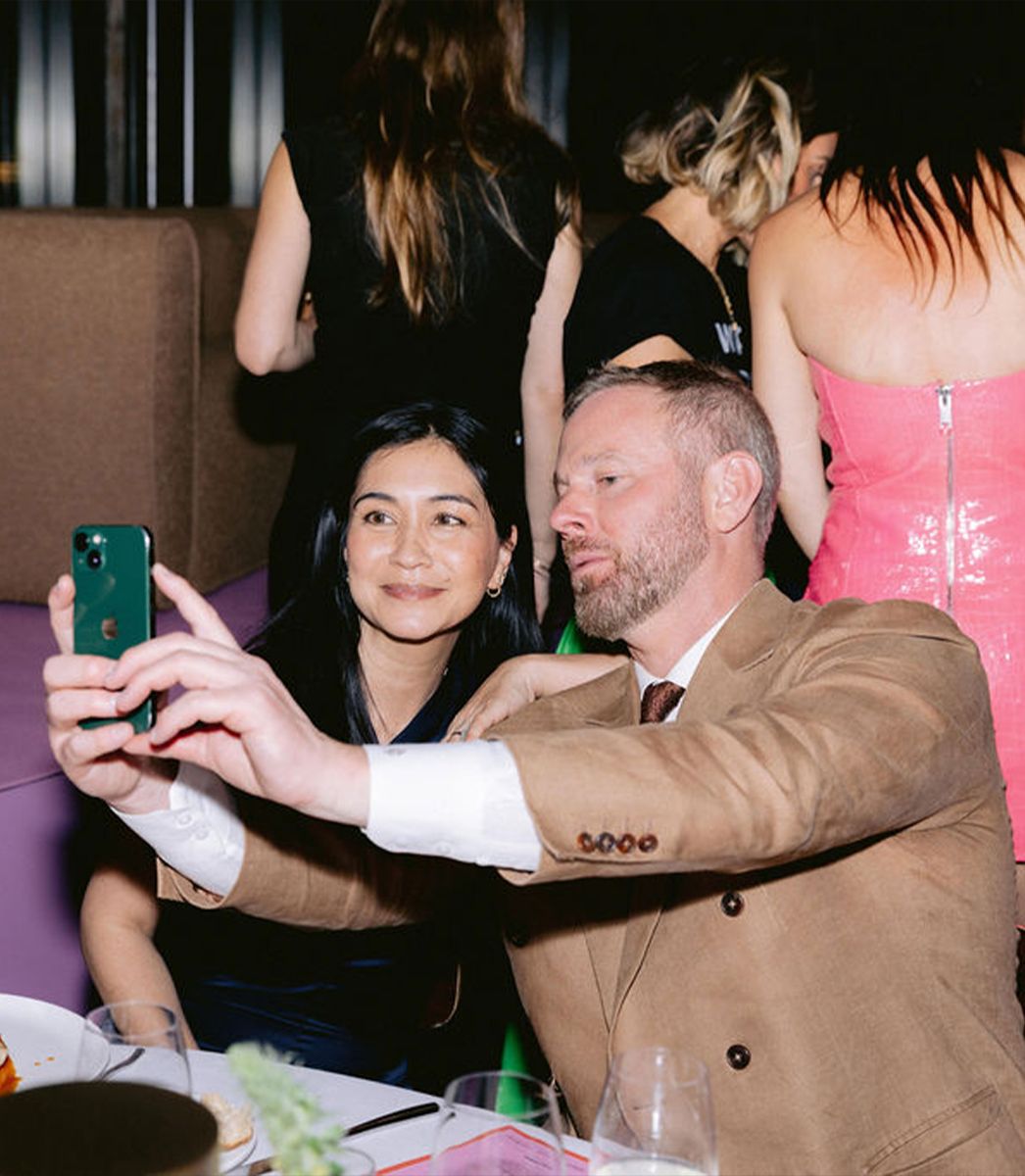
Living well with Richard Christiansen
In Flamingo Estate, he's built one of the most innovative and original brands on the planet. In his discussion with Editor-in-Chief Justine Cullen at the InStyle Beauty Summit, Christiansen talks about the importance of connection, radical inconsistency and ceremony.